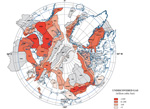The Green Economy Coalition is urging G20 finance ministers to rapidly put an end to fossil fuel subsidies. In a letter to the ministers, the coalition argues that these subsidies are contributing directly to climate change and making it difficult for the world to transition to a greener economy.
“These subsidies are a massive diversion of public funds that could be better spend in other ways,” says Mark Halle, executive director of IISD-Europe, a member of the coalition. “Subsidies create false impressions about the relative cost of lower-carbon energy alternatives and this is brining us closer to irreversible climate change.”
The Green Economy Coalition estimates that an end to fossil fuel subsidies would bring about a reduction of global carbon dioxide emission by 10 percent—the equivalent of Russia and Japan’s combined total.

Coal barge in Shanghai. Photo by: Rhett A. Butler. |
“The current annual fossil fuel subsidy bill of hundreds of billions of dollars would be better spent on health, education, renewable energy or other actions that would accelerate the transition to a green economy,” the coalition writes.
They add that the problem isn’t just subsidies for consumers, but those given out to large fossil fuel corporations.
“Whereas it is principally the developing world which grants low fuel prices to consumers, various more subtle subsidies are used to reduce the costs of producing and refining fossil fuels in all countries—developed and developing. To achieve the full benefits of subsidy reform, and to ensure that the burden is equitably shared, production subsidies should be explicitly included in G-20 members’ reform packages,” the letter says.
However, the Green Economy Coalition also states that subsidies must be phased out in a way that ensures the world’s poor are not negatively affected: “subsidy reform will need to be accompanied by specific ‘flanking’ measures that relieve or compensate for that burden on the poor.”
G20 leaders agreed in Pittsburgh in September to phase out fossil fuel subsidies over the medium term. While the Green Economy Coalition has welcomed that commitment, they say phasing out the subsidies should come faster.
The Green Economy Coalition includes members from the environment, development, business, labor and consumer sectors, such as the International Institute for Environment and Development, Consumers International, IUCN, and the International Institute for Sustainable Development (IISD).
The G20 comprises finance ministers and central bank governors from the EU, the US, China, Russia, the UK, India, Japan, Germany, France, Brazil, Australia, Canada, Saudi Arabia, Italy, Argentina, Mexico, South Korea, Turkey, Indonesia, and South Africa.
Related articles
US subsidies of oil and coal more than double the subsidies of renewable energy
(09/21/2009) During the fiscal years of 2002-2008 the United States handed out subsidies to fossil fuel industries to a tune of 72 billion dollars, while renewable energy subsidies, during the same period, reached 29 billion dollars.
Burning fossil fuels is disrupting nitrogen cycle
(06/04/2009) The burning of fossil fuels has disrupted the nitrogen cycle by altering that amount of nitrogen in the biosphere, according to scientists from Brown University and the University of Washington. It has long been known that fossil fuel combustion releases nitric oxides into the air—which combine with other elements to form both smog and acid rain—but until now scientists have been unsure as to the extent nitric oxide emissions have affected the natural nitrogen cycle.
Oil and gas bonanza discovered in the Arctic

(05/28/2009) 30 percent of the world’s undiscovered gas and 13 percent of its undiscovered oil is located north of the Arctic Circle, offering a potential bonanza for Russia, report researchers writing in the journal Science. Assessing natural resources around the North Pole, researchers from the United States Geological Survey (USGS) say the majority of undiscovered oil and gas will be found underwater on continental shelves, providing economic opportunities for countries with Arctic claims, including the U.S., Canada, Denmark/Greenland, Norway and Russia. The largest deposits of natural gas are expected in areas claimed by both Russia and Norway, whereas the most likely place for oil in the Arctic is in the Chukchi Sea, off northern Alaska.














